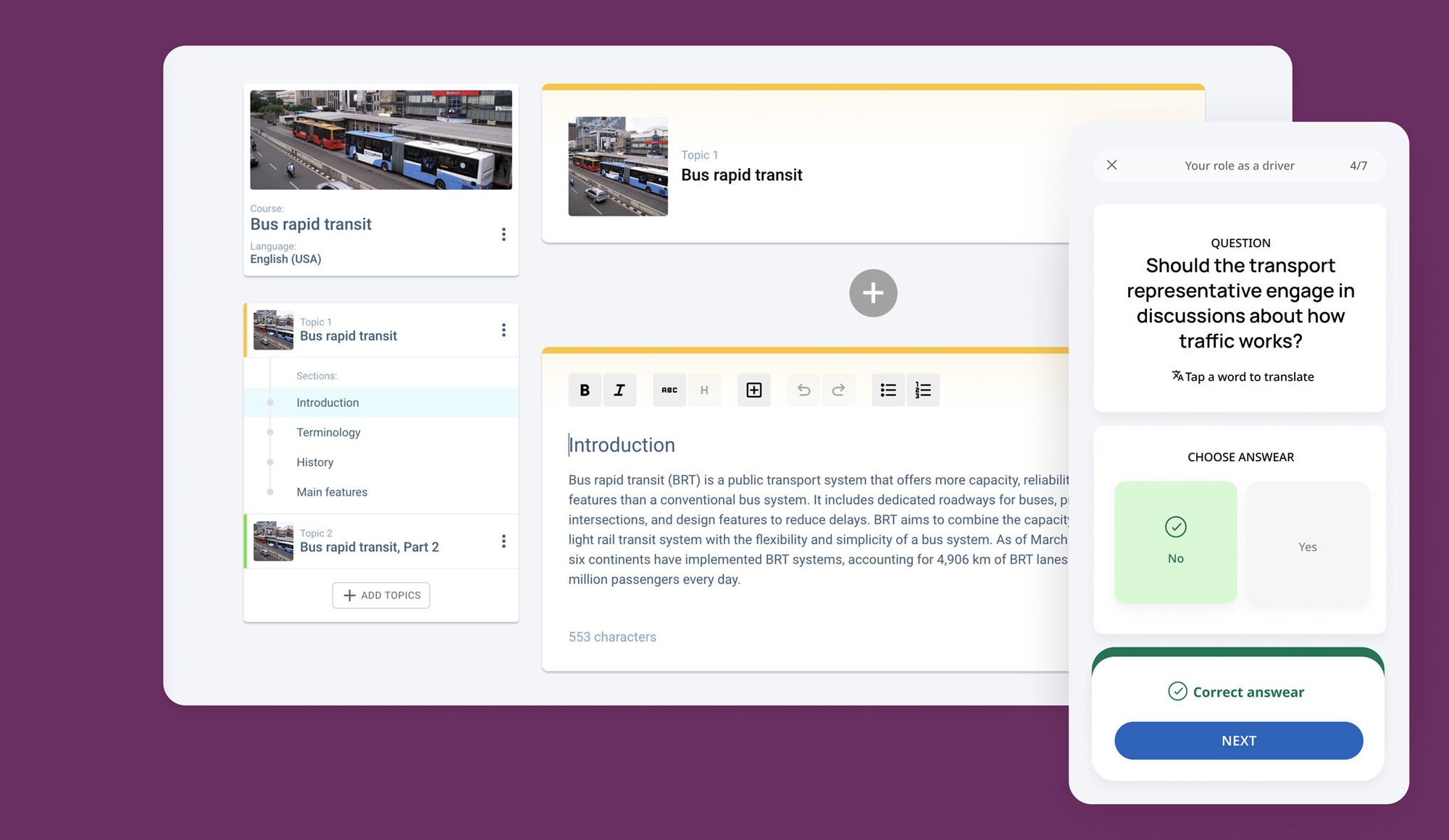Soft skills training for managers: 20 core benefits
1. Improve communication
Effective communication is the cornerstone of successful management. Managers must be able to convey their expectations clearly, actively listen to their team members, and provide constructive feedback. To improve your communication skills, consider taking courses or workshops, practising active listening techniques, and regularly checking in with your team to ensure everyone is on the same page.
Additionally, using open-ended questions can encourage team members to share more detailed information and insights. You can try practising soft skill training, summarising what you've heard to confirm your understanding and show that you value their input. Incorporate visual aids during meetings to clarify complex ideas and ensure that your body language is open and approachable to foster a more inclusive environment. Regularly solicit feedback on your communication style to identify areas for improvement and adapt to your team’s needs.
2. Develop emotional intelligence within your business environment
Emotional intelligence is the ability to understand and manage one's own emotions and recognise and empathise with those of others. Cultivating emotional intelligence allows managers to connect with their team members on a deeper level, build trust, and navigate conflicts more effectively. To enhance your emotional intelligence, take time to reflect on your emotions, practice empathy, and seek feedback from your team. With effective soft skills training, you can enhance interpersonal skills that are crucial for team spirit.
3. Master conflict resolution
Conflict is inevitable in any workplace, but how it is resolved can make all the difference. Managers should develop practical conflict resolution skills to address issues promptly and find mutually beneficial solutions. This may involve active listening, facilitating open discussions, and mediating disputes. By approaching conflicts with empathy and a problem-solving mindset, managers can maintain a harmonious and productive work environment. Soft skill training that focuses on mastering conflict management can be complemented by mentorship sessions to ensure higher results.
4. Enhance leadership development and motivation
A strong leader motivates and inspires their team to achieve exceptional results. To enhance your leadership skills, lead by example, celebrate achievements, provide regular feedback, and foster a positive work culture. Invest time in understanding what motivates each team member individually and tailor your approaches to keep them engaged and driven.
Within effective soft skills development trainings, you can set clear and achievable goals to provide direction and focus for your team. Encourage open communication and create an environment where team members feel comfortable sharing ideas and concerns.
During the soft skills training program, you can implement regular team-building activities to strengthen relationships and trust within the team. Stay adaptable and be willing to adjust your leadership style to meet your team's and the organisation's evolving needs.
5. Optimise time management and organisation
Managing your time effectively is vital for staying organised and meeting deadlines. Develop strategies to prioritise tasks, delegate responsibilities, and minimise distractions. Utilise calendars, to-do lists, and project management software to keep track of your commitments and ensure optimal productivity. By efficiently managing your time, you can set an example for your team and create a culture of efficiency.
Lingio’s AI-driven courses can be particularly useful in honing your time management skills. Our AI Course Creator provides personalised training experiences that adapt to your learning pace and style. This approach ensures that you can quickly grasp and implement effective time management techniques.
Additionally, Lingio's interactive modules and gamified learning tools make the training process engaging and enjoyable, helping you stay motivated and committed to improving your skills. With Lingio’s innovative training solutions, you can transform your approach to time management and lead your team to higher levels of productivity and success.
6. Strengthen decision-making and problem-solving
Managers are frequently faced with making decisions and solving complex problems. Strengthen your decision-making skills by gathering all relevant information, considering different perspectives, and weighing the pros and cons. Additionally, hone your problem-solving abilities by adopting a systematic approach, seeking input from your team, and being open to innovative solutions. Continuous learning and updating industry trends can also enhance your problem-solving capabilities.
7. Boost adaptability and flexibility for critical thinking
In today's rapidly changing work landscape, adaptability and flexibility are paramount. Things rarely go as planned, and managers who can adapt quickly and embrace change have a significant advantage. Foster a growth mindset, be open to new ideas, and see challenges as opportunities for growth. Encourage your team to embrace change and provide them with the necessary support and resources to navigate transitions effectively.
8. Cultivate coaching and mentoring skills
As a manager, one of your primary responsibilities is to develop your team members' skills and help them reach their full potential. Cultivate coaching and mentoring skills by providing guidance, constructive feedback, and growth opportunities. Regularly check in with your team members, identify their strengths and areas for improvement, and offer support and resources to aid their professional development. Investing in your team's growth ultimately benefits both the individuals and the organisation as a whole.
9. Build trust and rapport
Trust is the foundation of any successful team. Building trust requires consistent communication, transparency, and reliability. Be honest and open with your team, follow through on your commitments, and treat everyone respectfully. Encourage collaboration and create opportunities for team members to build relationships and bonds. By fostering trust and rapport, you can create a supportive, cohesive team that thrives on mutual respect.
10. Enhance cultural competence
Working with individuals from diverse backgrounds is increasingly common in today's globalised world. Managers must develop cultural competence to engage effectively with people from different cultures and backgrounds. Educate yourself about different cultures, their customs, and communication styles. Embrace diversity within your team and create an inclusive environment where everyone feels valued and respected.
11. Manage stress effectively
Managing stress is crucial for maintaining your well-being as a manager and setting a positive example for your team. Find healthy coping mechanisms such as exercise, meditation, or hobbies. Set realistic expectations for yourself and your team, and prioritise self-care. Recognise the signs of burnout and take proactive steps to prevent it, such as delegating tasks and seeking assistance when needed.
12. Improve delegation skills
Delegation is a vital skill for managers, allowing them to distribute workload efficiently and empower their team members. Identify tasks that can be delegated and match them with individuals' skills and interests. Communicate expectations, provide necessary resources, and offer guidance and support where needed. Effective delegation not only reduces your workload but also fosters the growth and development of your team members.
13. Develop public speaking and presentation skills
When communicating with stakeholders, delivering presentations, and leading meetings, public speaking and presentation skills are essential for managers. Practice speaking in front of others, seek opportunities to present, and seek feedback to improve your delivery. Utilise visual aids and storytelling techniques to engage your audience and make your message more memorable. With practice and perseverance, you can become a confident and persuasive communicator.
14. Sharpen negotiation skills
Negotiation soft skills are crucial for managers when dealing with clients, vendors, and internal stakeholders. Hone your negotiation skills by understanding the interests of all parties involved, being prepared with alternative solutions, and maintaining a collaborative approach. Practice active listening and effective communication during negotiations to achieve mutually beneficial outcomes.
15. Expand networking and relationship-building
Networking is an essential skill for managers as it allows for exchanging ideas, collaboration, and potential opportunities. Actively seek out networking events, join industry-related groups, and engage in online communities to expand your professional network. Cultivate meaningful relationships by taking a genuine interest in others, offering assistance, and maintaining regular interactions. Your network can provide valuable support, advice, and career advancement opportunities.
16. Focus on customer satisfaction
Customer satisfaction is crucial for the success of any business. As a manager, make it a priority to understand your customers' needs and expectations. Collect feedback, address customer concerns promptly, and implement improvements based on customer feedback. Encourage your team to prioritise customer satisfaction and provide them with the necessary tools and training to deliver exceptional customer service.
17. Provide effective feedback and performance reviews
Providing constructive feedback is essential for managers to support their team members' growth and development. Regularly provide feedback on strengths and areas for improvement, and do so respectfully and constructively. Schedule regular performance reviews to discuss progress, set goals, and create development plans. You can motivate your team and help them reach their full potential by providing effective feedback.
18. Foster continuous improvement and learning
Continuous improvement is vital for staying competitive in today's rapidly evolving business landscape. Encourage a culture of learning within your team by providing training opportunities, supporting professional certifications, and facilitating knowledge-sharing sessions. Foster an environment where mistakes are seen as learning opportunities and innovation is encouraged. You can ensure your team remains adaptable and innovative by prioritising continuous improvement.
19. Develop effective team-building strategies
Building a solid and cohesive team is essential for achieving long-term success. Managers should develop effective team-building strategies to foster collaboration, trust, and synergy among team members. This can be done through team-building activities, regular team meetings, and creating opportunities for team members to collaborate on projects. By investing in team-building, managers can create a positive and supportive work environment that encourages creativity and productivity.
20. Embrace technology and digital skills
Managers should embrace technology and develop digital skills to stay relevant and efficient. Familiarise yourself with the latest digital tools and software relevant to your industry. Stay updated on emerging technologies and trends that can enhance your team's productivity and streamline processes. By embracing technology, managers can leverage its power to drive innovation, improve communication, and stay ahead in a rapidly evolving business landscape.
Lingio’s AI-driven courses can significantly aid in developing your digital skills. Our AI Course Creator tailors learning experiences to your specific needs, ensuring you quickly and effectively grasp new technologies and tools. Lingio's interactive modules offer hands-on practice with the latest software, making the learning process both practical and engaging.



